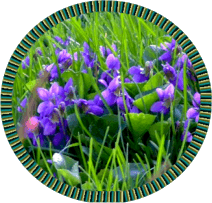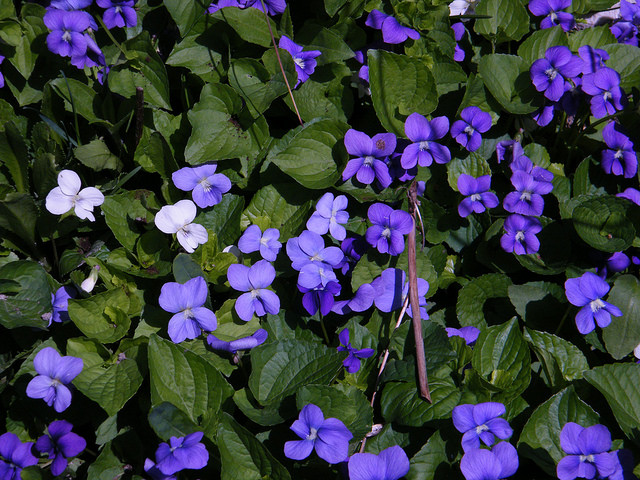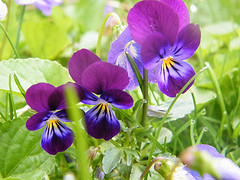CLICK: Color Control Color Choice

My gardens' brilliant array of many violets in the Spring can testify to the fact that I am a lover of these beautiful, natural wildflowers. When touring violet facts on the net, I thought of what types of violet I had collected, next to the new ruffled pansies and giant lilies, etc.

I had moved from one home to another, twenty miles away, taking care to transplant my precious, tufting violets. They were huge flowers for violets, and they created over a hundred flowers on one eight inch tuft. I moved to the new home in February, and little did I know that my husband to be was also a violet collector! His garden had whole beds of purple violets, very similar to mine, and also a wondrous, twinkling collection of only white Violas alba!
When we moved again, as I recall, I had separated eight of each violet. Duh, purple and white.
I planted them under our new cedar hedges, the way they had grown back in the sticks. They enjoy more monoxide?
In only three years, after my second move, I had a huge populus of violets. They grew everywhere, and I enjoyed their glowing purple beauty as flowering groundcover every spring- right in the front garden bed.
My white violets (Viola alba) have been less invasive, and the yellow ones that I had collected from the forest (Viola biflora) do not spread, at all. Their plant entity is comfortable without having to reduplicate by the thousands!
I had also found a violet that I'd never seen before; a small, raised series of whiteish-mauve flowers on pale yellow-green vegetation. They are almost pink, actually. These are far more of a wildflower, called Viola canadensis, or Canadian Violet
I found that a mix of white and deep purple flowers eventually mated, producing a pearly, glowing regular mauve violet. This violet (Viola sororia ) has produced several flowers that are half the size of a modern pansy flower!! (Viola sororia - "sister" violet, is also called Wood Violet, but this is the Common Blue Wood Violet)
Of course, they grew in the lawn, where, unhappily, many, many of their brothers and sisters enjoy tenacity while supported by the grass roots and cover through the winter!
I weeded the front lawn three times this spring, hoping to heft monumental tufts of the purple variety before they took over the whole lawn. Usually, each year, I offer free flats of violets on the internet (Used Ottawa .com) I find that I can find a home for just about everything! This year, I was too busy with larger projects, so I sent them to the landscape recycle.
Once weeded, my lawn was coated with topsoil and reseeded. The grass took too slowly, and new violets sprang up from the newly denuded lawn. I weeded again, and added at least eight inches of packed topsoil then more seed. Sure enough, there are violets in the lawn, a - gain. I can just hear them gurgling: "do A-gain!" The little sprouts!
 Not that I know what to do with the Jumping Jacks (Viola tricolor), either! They seem to enjoy only the lawn, blooming until past December, even in Ontario!
Not that I know what to do with the Jumping Jacks (Viola tricolor), either! They seem to enjoy only the lawn, blooming until past December, even in Ontario!
I had asked a lawn specialist about weed control, and he said there was little one could do with violets except to massively top and overseed with grass seed.
On a more investigative note, I found a wealth of material about violets, useful for we "potty" herb hobbyists. Violet can be used for a number of herb remedies. The violet is fairly insignificant, to date, and its medicinal effects are well-known only to people who make soap and perfume.
Perhaps you will enjoy finding useful things to do with your parade of the little spring flowers, after you have read the violet medicine article. Yes, bake and boil them. Candy them, too!

LINK HERE TO: Violet Medicine Article
